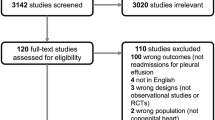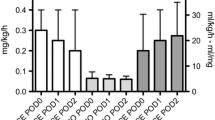Abstract
A prospective, one-armed, safety non-inferiority trial with historical controls was performed at a single-center, quaternary, children’s hospital. Inclusion criteria were children aged 3 months–18 years after pediatric cardiac surgery resulting in a two-ventricle repair between 7/2020 and 7/2021. Eligible patients were compared with patients from a 5-year historical period (selected using a database search). The intervention was that “regular risk” patients received no diuretics and pre-specified “high risk” patients received 5 days of twice per day furosemide at discharge. 61 Subjects received the intervention. None were readmitted for pleural effusions, though 1 subject was treated for a symptomatic pleural effusion with outpatient furosemide. The study was halted after an interim analysis demonstrated that 4 subjects were readmitted with pericardial effusion during the study period versus 2 during the historical control (2.9% versus 0.2%, P = 0.003). We found no evidence that limited post-discharge diuretics results in an increase in readmissions for pleural effusions. This conclusion is limited as not enough subjects were enrolled to definitively show that this strategy is not inferior to the historical practice. There was a statistically significant increase in readmissions for pericardial effusions after implementation of this study protocol which can lead to serious complications and requires further study before conclusions can be drawn regarding optimal diuretic regimens.

Similar content being viewed by others
References
Talwar S, Agarwala S, Mittal C et al (2010) Pleural effusions in children undergoing cardiac surgery. Ann Pediatr Card 3:58–64
Bocsi J, Hambsch J, Osmancik P et al (2002) Preoperative prediction of pediatric patients with effusions and edema following cardiopulmonary bypass surgery by serological and routine laboratory data. Crit Care 6:226–233
Hughes A, Carter K, Cyrus J, Karam O (2020) Pleural effusions after congenital cardiac surgery requiring readmission: a systematic review and meta-analysis. Pediatr Cardiol 41:1145–1152
Vaynblat M, Chiavarelli M, Anderson J et al (1997) Pleural drainage after repair of tetralogy of fallot. J Card Surg 12:71–76
Mott A, Fraser C, Kusnoor A et al (2001) The effect of short-term prophylactic methylprednisolone on the incidence and severity of postpericardiotomy syndrome in children undergoing cardiac surgery with cardiopulmonary bypass. JACC 37(6):1700–1706
Trivedi M, Diaz-Castrillon C, Morell E (2022) Standardizing discharge furosemide duration following congenital heart surgery. World J Pediatr Congenit Heart Surg 13(1):16–22
Elias M, Glatz A, O’Connor M et al (2017) Prevalence and risk factors for pericardial effusions requiring readmission after pediatric cardiac surgery. Pediatr Cardiol 38(3):484–494
Acknowledgments
Alexa Harris PA-C and Grace Golan PA-C for their invaluable efforts in the surgical clinic follow up of these subjects. Dr. Ricardo Briceño for sharing his post-discharge diuretic regimen and follow up with us which informed our study design. We also appreciate consultations with Dr. Evonne Morrell regarding her experience with pericardial effusions during the quality improvement project she published.
Author information
Authors and Affiliations
Contributions
All authors contributed to the study conception and design. Material preparation, data collection, and analysis were performed in part by all authors. The first draft of the manuscript was written by Jamie Penk and all authors commented on previous versions of the manuscript. All authors read and approved the final manuscript.
Corresponding author
Ethics declarations
Conflict of interest
The authors declare no competing interests.
Additional information
Publisher's Note
Springer Nature remains neutral with regard to jurisdictional claims in published maps and institutional affiliations.
All work performed at Ann & Robert H. Lurie Children’s Hospital of Chicago.
Rights and permissions
Springer Nature or its licensor (e.g. a society or other partner) holds exclusive rights to this article under a publishing agreement with the author(s) or other rightsholder(s); author self-archiving of the accepted manuscript version of this article is solely governed by the terms of such publishing agreement and applicable law.
About this article
Cite this article
Penk, J.S., de Faria, G.B., Collins, C.A. et al. ‘Are Routine Post-discharge Diuretics Necessary After Pediatric Cardiac Surgery?’. Pediatr Cardiol 44, 915–921 (2023). https://doi.org/10.1007/s00246-022-03078-6
Received:
Accepted:
Published:
Issue Date:
DOI: https://doi.org/10.1007/s00246-022-03078-6




